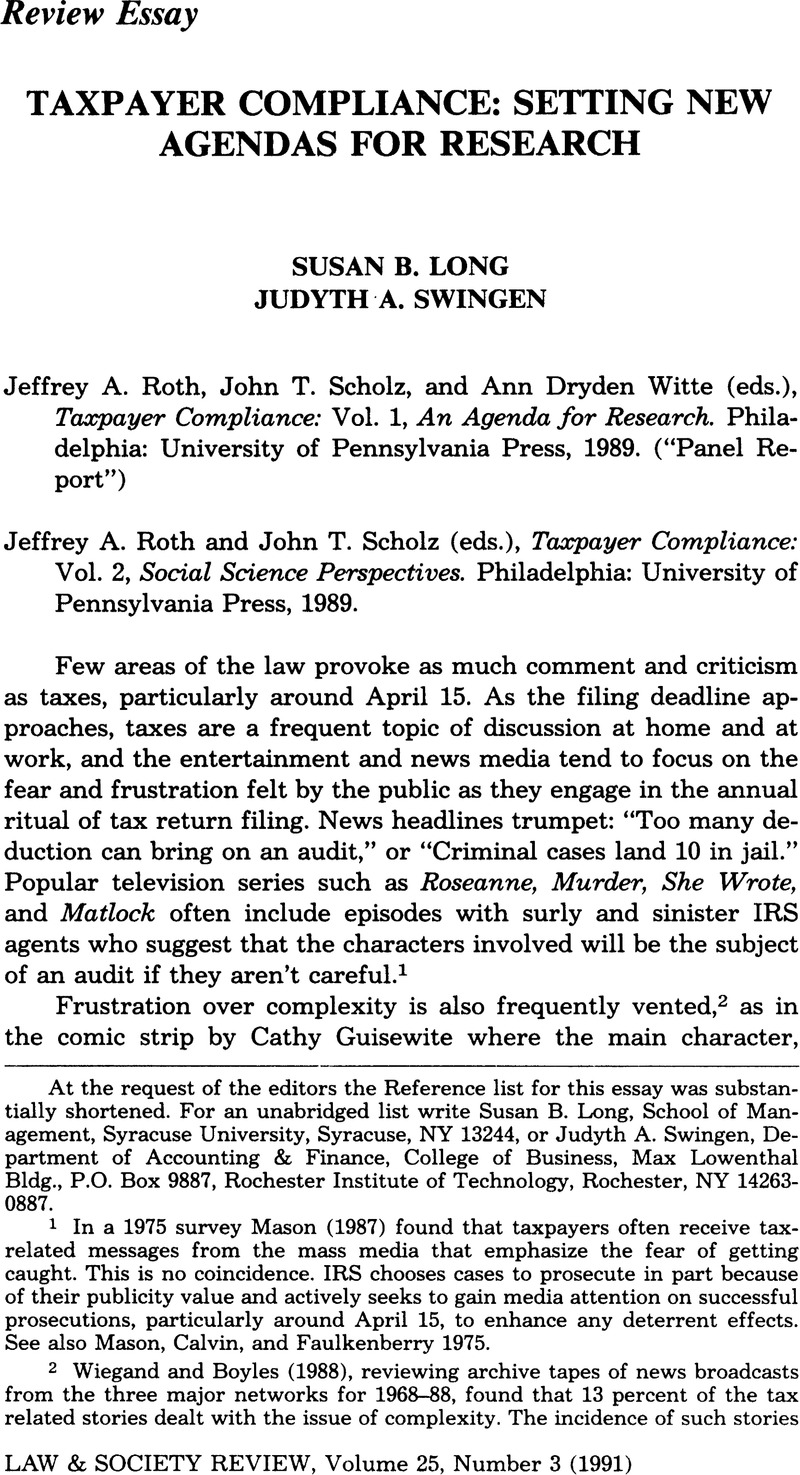Crossref Citations
This article has been cited by the following publications. This list is generated based on data provided by Crossref.
MASON, LAURIE
and
MASON, ROBERT
1992.
A Moral Appeal for Taxpayer Compliance: The Case for a Mass Media Campaign*.
Law & Policy,
Vol. 14,
Issue. 4,
p.
381.
Newberry, Kaye J.
Reckers, Philip M.J.
and
Wyndelts, Robert W.
1993.
An examination of tax practitioner decisions: The role of preparer sanctions and framing effects associated with client condition.
Journal of Economic Psychology,
Vol. 14,
Issue. 2,
p.
439.
Smith, Kent W.
and
Stalans, Loretta J.
1994.
Negotiating Strategies for Tax Disputes: Preferences of Taxpayers and Auditors.
Law & Social Inquiry,
Vol. 19,
Issue. 02,
p.
337.
Antonides, Gerrit
and
Robben, Henry S.J.
1995.
True positives and false alarms in the detection of tax evasion.
Journal of Economic Psychology,
Vol. 16,
Issue. 4,
p.
617.
Alford, John
1998.
A Public Management Road Less Travelled: Clients as Co‐producers of Public Services.
Australian Journal of Public Administration,
Vol. 57,
Issue. 4,
p.
128.
Kinsey, Karyl A.
and
Stalans, Loretta J.
1999.
Which “Haves” Come Out Ahead and Why? Cultural Capital and Legal Mobilization in Frontline Law Enforcement.
Law & Society Review,
Vol. 33,
Issue. 4,
p.
993.
Alford, John
2002.
Why Do Public-Sector Clients Coproduce?.
Administration & Society,
Vol. 34,
Issue. 1,
p.
32.
Riahi-Belkaoui, Ahmed
2004.
Relationship Between Tax Compliance Internationally and Selected Determinants of Tax Morale.
SSRN Electronic Journal ,
Riahi-Belkaoui, Ahmed
2004.
Relationship between tax compliance internationally and selected determinants of tax morale.
Journal of International Accounting, Auditing and Taxation,
Vol. 13,
Issue. 2,
p.
135.
Richardson, Grant
2006.
Determinants of tax evasion: A cross-country investigation.
Journal of International Accounting, Auditing and Taxation,
Vol. 15,
Issue. 2,
p.
150.
Picur, Ronald D.
and
Riahi‐Belkaoui, Ahmed
2006.
The impact of bureaucracy, corruption and tax compliance.
Review of Accounting and Finance,
Vol. 5,
Issue. 2,
p.
174.
Richardson, Grant A.
2007.
The Relationship between Culture and Tax Evasion: A Cross-Country Study.
SSRN Electronic Journal,
Riahi-Belkaoui, Ahmed
2008.
Taxation and Public Finance in Transition and Developing Economies.
p.
3.
Ashby, Julie S.
and
Webley, Paul
2008.
‘But everyone else is doing it’: a closer look at the occupational taxpaying culture of one business sector.
Journal of Community & Applied Social Psychology,
Vol. 18,
Issue. 3,
p.
194.
Eisenhauer, Joseph G.
2008.
Ethical preferences, risk aversion, and taxpayer behavior.
The Journal of Socio-Economics,
Vol. 37,
Issue. 1,
p.
45.
Richardson, Grant
2008.
The relationship between culture and tax evasion across countries: Additional evidence and extensions.
Journal of International Accounting, Auditing and Taxation,
Vol. 17,
Issue. 2,
p.
67.
Ghani, Nor Azrina Mohd Yusof
Lai, Ming Ling
and
Yap, Bee Wah
2012.
Tax non-compliance: Evidence from finalized corporate tax audited cases in 2010.
p.
694.
Jones, Christopher R.
and
Sejati, Yuyun
2013.
Improving Use-Tax Compliance by Decreasing Effort and Increasing Knowledge.
The ATA Journal of Legal Tax Research,
Vol. 11,
Issue. 1,
p.
1.
Kundt, Thorben Christian
Misch, Florian
and
Nerre, Birger
2013.
Re-Assessing the Merits of Measuring Tax Evasions through Surveys: Evidence from Serbian Firms.
SSRN Electronic Journal,
Muhammad, Izlawanie
2013.
An Exploratory Study of Malaysian Tax Auditors’ Enforcement Regulatory Styles.
Procedia Economics and Finance,
Vol. 7,
Issue. ,
p.
188.



